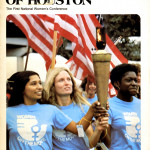 Nancy Beck Young and Leandra Zarnow (Web)
Nancy Beck Young and Leandra Zarnow (Web)
Time: November 5-7, 2017
Venue: University of Houston
Proposals are due on August 10, 2017
This year marks the 40th Anniversary of the 1977 National Women’s Conference, the domestic answer to the United Nations‘ International Women’s Year initiative. The Houston Conference, as it came to be known, was the largest federally mandated gathering of American women in history. On this occasion, 2000 delegates elected from fifty states and six territories and roughly 16,000 observers came together to craft a twenty-six plank National Plan of Action, submitted to President Jimmy Carter in 1978.
The conference remains one of the most imaginative and wide-ranging exercises in civic engagement realized in the twentieth century, and the organizers seek to draw attention to the diversity, ingenuity, and determination of participants who dared to dream up concrete policy goals of „what women want.“ The recent global response to the Women’s March on Washington suggests just how much the issues debated at the Houston Conference still resonate.
During the conference the organizersaim to take stock of this momentous feat as well as consider the separate concerns articulated at a „pro-family“ counter-convention held in Houston simultaneously. A scholarly academic symposium will coincide with a delegate and observer reunion. Commemorative activities will occur simultaneous to academic sessions and begin the prior weekend. In holding two events at once, they seek a cross-pollination of ideas and action, bringing together academics and activists, current and lifetime students and teachers, and those that remember being there alongside those who seek to carry the torch forward.
The organizers would like to take the occasion of the 40th Anniversary of the National Women’s Conference to engage a fresh conversation about U.S. politics and society in the last quarter of the twentieth century. Issues debated at the Houston Conference have dominated American culture since: LGBTQ and racial civil rights; family planning and reproductive health; immigration and civil justice; access to education and childcare; welfare and government spending; poverty and wealth distribution; environmentalism; foreign policy priorities; globalization and a shifting workforce; and gender neutrality and protection in law.
Likewise, the organizers seek papers that engage these broad currents. Work that interrogates the conference itself, the context from which it developed, its prominent themes, and its legacy will be considered. Papers need not focus on the conference per se or women’s history in general. Rather, the organizers aim to foster a dialogue about contemporary history and society using this conference—a barometer of its times—as a jumping off point. The organizers seek the participation of scholars who explore institutional politics, social movements, cultural conflicts, global and transnational politics, and economic turmoil.
The organizers welcome individual paper proposals as well as complete or partial session proposals. Format ranges from dynamic roundtable discussions to more traditional sessions with three papers and a chair/commentator. They are especially interested in sessions that mix academic research with the experience of activists. They envision this conference to be a forum for interdisciplinary thinking and encourage broad methodology, perspective, and disciplinary grounding (such as history, political science, public policy, English, economics, sociology, and the arts).
Questions that could be considered by participants include: Why did a policy forum that emerged from bi-partisanship become a caustic ideological battleground? What political, economic, and social changes underway manifested reaction and response at this conference and the coinciding counter-conference? In what ways do the issues considered at the National Women’s Conference still resonate? Is the leading question asked then—what do women want?—still relevant today?
Tentative schedule
November 5
- Commemorative Activities Around Houston
November 6
- 9-10:20: Panel One
- 10:30-11:50: Panel Two
- 12-2: Luncheon with Keynote Speaker, Marjorie Spruill, author of Divided We Stand: The Battle Over Women’s Rights and Family Values That Polarized American Politics.
- 2:30-3:50: Panel Three
- 6-8: Public Evening Program and Reception: McGovern Lecture by Martha Cotera and Delegate Panel to Follow
November 7
- 9-10:20: Panel Four
- 10:30-11:50: Panel Five
- 12-2: Living History Panel: Houstonians Host the National Women’s Conference
- 2:30-3:50: Panel Six
- 6-8: Public Evening Program and Reception
Ongoing activities include: poster/book sessions; oral history commons; film screenings; special collections tours; student-delegate issue dialogues; wikistorming edit-a-thon; self-guided walking tours.
Traditional paper session and roundtable proposals: Abstracts should include a short session description and title, individual paper titles, one page proposals of approximately 300 words for each paper, and one page CVs for all participants including chair/commentator.
Individual paper proposals: Abstracts should be 300 words, and should be accompanied by a one page CV.
While we do not promise travel support, please indicate on your proposal if you request such support should it become available. A separate application for these funds will be issued to selected participants should we have such funds to distribute. Priority consideration for such funds will be given to graduate students and adjuncts.
Extended submission deadline: August 10, 2017
Please submit applications as one PDF at: houstoncon17@gmail.com
For questions, please consult our website: http://classweb.uh.edu/iwynatlwomensconf/
The contact Nancy Beck Young: nyoung@central.uh.edu, or Leandra Zarnow: lrzarnow@central.uh.edu
Source: H-Women
